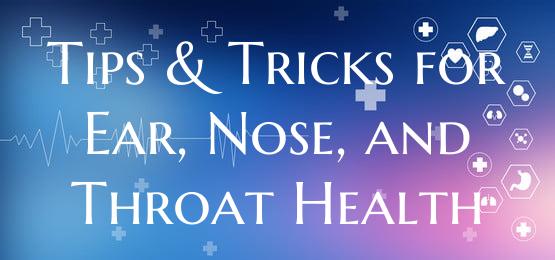
Tips & Tricks for Ear, Nose, and Throat Health
Maintaining good ear, nose, and throat health is essential for overall well-being and quality of life. Here are some helpful tips and tricks to keep these vital areas in top condition:
1. Regularly Cleanse Your Nasal Passages: Use a saline solution or a neti pot to help flush out impurities, dust, and allergens from your nasal passages. This can help prevent infections and keep your sinuses clear.
2. Avoid Loud Noise: Protect your ears from loud sounds that can damage your hearing. Wear ear protection in noisy environments and keep the volume of music and other electronic devices at a moderate level.
3. Stay Hydrated: Drinking an adequate amount of water is important for maintaining healthy mucous membranes in your throat and nose. It can help prevent dryness and irritation in these areas.
4. Practice Good Hygiene: Wash your hands frequently to prevent the spread of germs that can cause ear, nose, and throat infections. Avoid touching your face with dirty hands to reduce the risk of transferring bacteria.
5. Quit Smoking: Smoking can have a detrimental effect on your ear, nose, and throat health. It can irritate the mucous membranes, increase the risk of infections, and contribute to throat and sinus issues. Quitting smoking can significantly improve the health of these areas.
6. Use a humidifier: Dry air can aggravate nasal passages and throat, causing discomfort and irritation. Using a humidifier in your home can help maintain moisture levels and prevent dryness.
7. Eat a Balanced Diet: Consuming a diet rich in vitamins and minerals can boost your immune system and help ward off infections in your ear, nose, and throat. Include foods high in antioxidants, such as fruits and vegetables, in your daily meals.
8. Consider Allergies: If you suffer from allergies that affect your ear, nose, and throat, work with your healthcare provider to develop a management plan. Avoid allergens that trigger your symptoms and consider medications or allergy shots to help control your body's response.
9. Regular Check-ups: Schedule regular check-ups with an ENT (ear, nose, and throat specialist) to monitor your overall ear, nose, and throat health. They can identify any potential issues early on and provide appropriate treatment.
By incorporating these tips and tricks into your daily routine, you can help maintain optimal ear, nose, and throat health and reduce the risk of complications. Remember, taking care of these essential body parts is key to supporting your overall health and well-being.